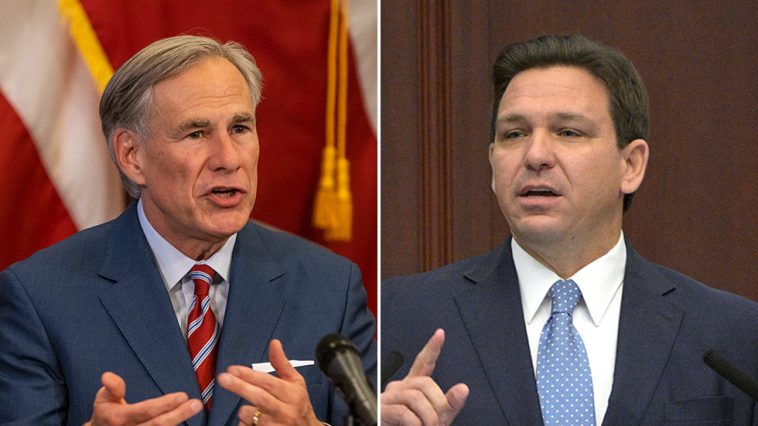In the face of immigration challenges, Florida’s head of government, Ron DeSantis, has offered his support to Texas Governor Greg Abbott. The two governors’ combined efforts revolve around enhancing security measures on Texas’ border with Mexico in a bid to regulate the movement of immigrants entering Texas from Mexico. This development unfolds during a time when Abbott finds himself in a stern standoff with President Biden’s administration over how best to manage the border situation.
The Supreme Court is siding with the Biden administration against Texas by allowing the federal government to take down razor wire on the border.
Texas is trying to enforce our laws and uphold our sovereignty while the federal government is disregarding the law and ignoring its… pic.twitter.com/EqzY8OWlQ1
— Ron DeSantis (@RonDeSantis) January 22, 2024
Just this past week, the U.S. Supreme Court ruled in favor of the Biden administration, allowing them to modify or entirely remove portions of razor wire installed by the Texas National Guard along the state border. The purpose of this razor wire had been to deter illegal immigration, a policy largely favored by both Abbott and DeSantis.
Governor Abbott voiced his concerns on Wednesday regarding Biden’s handling of border security. Mentioning that the administration’s inability to fully secure the border was an infraction as per Article IV, § 4, he stated that this situation warranted the implementation of emergency measures as per Article I, § 10, Clause 3. This law entrusts the states with the right to self-defense.
Abbott took this opportunity to explain the underlying reasons for his actions. He affirmed his interpretation of the law, declaring that an invasion was taking place. In accordance with Article I, § 10, Clause 3, Abbott proclaimed that Texas had the constitutional authority necessary to enforce its own defense mechanisms and guarantee the security of its territories.
In his closing statement, the Texas Governor emphasized the sanctity of state rights. He declared that the authority of Texas as enshrined by the constitution superseded that of any federal law that contradicts it. As such, the authority of the state was, in his view, ‘the supreme law of the land.’
Governor Abbott went on to shed light on the role of Texas’ security forces, including the Texas National Guard, and other personnel on the ground. He asserted that these forces were executing their duties in line with the assertion of state authority. Their actions, he claimed, were an example of state power and law being used to secure Texan borders.
DeSantis’ support of Abbott’s initiative naturally stems from a shared perspective on how border security should be handled. Both believe in a more direct, hands-on approach, granting the states more authority in dealing with border influx, as opposed to relying on federal directions that may compromise the security of their states.
Thus, with the Supreme Court’s recent ruling, the two governors find themselves maneuvering in an increasingly complex landscape, where the balance between federal dictates and state rights is being tipped. They recognize the dangers that can stem from unrestricted immigration and the potential threats to security and the stability of their regions. In this, they stand united.
A defining aspect of their collaboration is the shared belief in the right of each state to protect itself. Hence, they plea for the right to enforce their own measures to control immigration, even if it seemingly contradicts federal policy. They perceive this as a necessary step to protect the interests and safety of the residents in their respective jurisdictions.
Contrary to this, however, the Biden administration’s stance appears more lenient towards immigration, marked prominently by the recent Supreme Court decision that allows the administration to alter or remove the razor wire. This has intensified the difference in perspective between the state governors and the federal government.
Despite the ongoing debate regarding border security and immigration, the commitment of Governors DeSantis and Abbott to protecting their respective states is clear. They exhibit unwavering resolve to maintain and, whenever possible, enhance protective measures on the Texas-Mexico border, adhering to a core belief which posits states should take a pivotal role in border management.
This conflict underscores an intriguing aspect of American federalism, which which allows the states and the federal government to simultaneously exercise certain prerogatives. In the face of a crisis, the question emerges whether the onus falls more heavily on the state or the federal government for safeguarding American territories.
Looking ahead, the resolution of this tussle between state rights and federal directives will set a precedent having potential impact on future interactions between the two levels of government. Needless to say, the decisions made today will ripple outwards, affecting not just Texas or Florida, but the entire United States.



